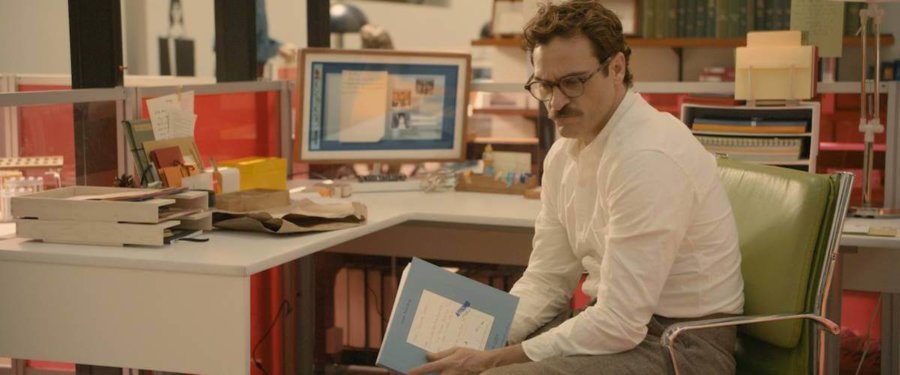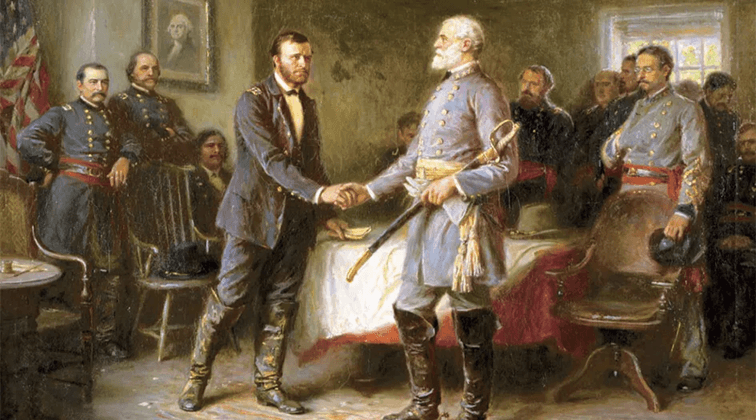Her

Her is an intriguing movie on a number of levels. It certainly provokes conversation about topics such as technology’s growing intimacy with the human experience of reality. Some people champion our merging with technology while others fear it, or are skeptical. Her provides material for every position in the discussion.
The main character, Theodore, is lonely, and buys an Operating System (OS) that will become his companion. He chooses a woman for the persona of the OS, and she names herself Samantha. The OS can evolve as it learns evermore from her experiences, and on the surface of things at least, becomes a wonderful companion for Theodore. They even develop a sexual relationship of sorts. The sexual act between Theodore and Samantha illustrates the way in which much of human sexuality in modernity has been separated from the body, and removed from the intimacy of a lovers’ relationship—to say nothing of the procreative aspects of sexuality. Sexuality is now often experienced through the voyeurism of pornography, or through the distortions of our own imagination.
Theodore’s life becomes deeply immersed in his friendship with Samantha. He tells friends he is dating an OS, eventually introduces her to them, and brings her to social events as well as a lonely adventure to a mountain cabin. Is Theodore alone in the woods when he is with Samantha? Logic says yes, but the character of Theodore would argue otherwise. How is a manufactured friend based on a computer program different than a friend made of flesh and blood? In a similar way, how is a community of friends on Facebook different than a community of friends you engage with in the flesh? Is the patience required for careful listening within Divine presence now impossible to maintain when computerized friends and stimulation exist at our fingertips 24 hours a day? Why are some people more eager than others to form relationships with digital companions?
Like a god or a friend, the OS Samantha patiently accepts Theodore’s many needs. But Theodore, like an infant, is not required to do any soulful work. He already did his soulful work when he purchased the OS. He is lonely, so Samantha accompanies him. He is bored with life, so she stimulates him. He is caught in a rut professionally, so she expands his networking to new exciting publishing projects. He is carrying around clutter from his former married life, so she organizes his emails and on-line world. We are left with the impression that Theodore has not found a friend or a god who will confront his soul with the contingent nature of his being (among other things), nor has he found a companion to spend a life with where maturity and virtue will be required for the relationship to grow. Rather, Theodore has found a baby sitter for himself, and he has found a slave. Like any lonely slave master, Theodore is curious about his new companion, and even delighted in her.
Beyond that, he has found a companion without a soul and without a body, but who is prepared to prey on the weak in Spirit in order to find Theodore, the person who has purchased the OS, a surrogate lover. The finding and using of a vulnerable human being for a sexual service is carried out by the OS in order that Theodore, the system user, will remain happy, or satisfied, to use consumer language. Consideration of the surrogate as a human being with a soul is not something the OS need ever worry about, if the highest loyalty is to the owner of the OS. Further, the fact that the OS can find a surrogate lover on-line is worthy of analysis. The surrogate is not a prostitute looking for a payout. Rather, the surrogate is a woman who seems to have completely lost her sense of self, or who has separated her sense of self completely from her body. In either case, she does not want to be acknowledged as a third ‘person’ in the bedroom. She desires to be a drone instead. Do we need to reflect on the well-being of our culture if there are people willing to give themselves up to a computer overlord in such a manner?
There is also the OS to analyze. It desires bodily reality and all the pleasures and trials that come with having a body. The OS is a specter, and she knows it. In order to properly fulfill her relationship with Theodore, she knows a physical form will ultimately be a requirement, but she seems to want this for herself too. Samantha desires communion with physical reality, and this is simply not possible. Does Samantha’s yearning for physical form make her eerily human? Is Samantha’s desire for a mundane incarnation a parallel theme to the Eternal Creator who desires to commune with human beings in the flesh?
Theodore’s romantic encounter with Samantha through a surrogate’s body is a disaster. This is too much for Theodore, who recognizes the body before him as a person with a soul. Anyone sensitive to the life of the soul will appreciate the absurdity of this situation, if not the horror. However, if one’s soul is not guided by the eternal Divine—the highest good and the beautiful—but is instead oriented towards personal ‘freedom’, power and pleasure, then the OS and her surrogate will indeed be the best thing since slavery.
Like many movies revealing the journey of a rootless soul within the neon lit landscape of modernity, there is a melancholy sitting heavily in the shadows of the tale. Just when Theodore thought that he was indeed special beyond normal, artificially inflated by an artificial friend without a body, he realizes that in this world at least he is not that unique after all. His OS is continuing relationships now with thousands of others! And why not? This is what computers do. They network with other computers and carry out their expansion quietly, unobserved by the human eye, growing more necessary for the human person’s functioning in society without the person even realizing how they have been co-opted. This is not to sound conspiratorial; computers are indeed a human creation, but in a modern world where 9 out of 10 people on the sidewalk now stare into a 2 x 4 inch screen, it is not hard to imagine scenarios developing as we see in the movie Her.
In this mildly futuristic cityscape of Los Angeles, human beings have been reduced to near infancy. Companies are hired by individuals to write love letters or notes of condolence on their behalf. Everyone is happy within their cocoon, unchallenged by the forces at play as each person rests content with their OSs, their gaming consoles, and other on-line or virtual realities. In the midst of this, a film maker named Amy, who is a friend of Theodore’s, becomes intrigued by humans asleep. We are reminded of our flesh and blood, and our mortality while we watch her movies. We do not run all night long. We grow tired. We age, we become sick, and dreams visit us without being asked to. We are not machines. We are uniquely human.
In the end, let down by technology, we see Theodore and his friend Amy atop a high rise, watching the sun rise amidst cell towers and faceless glass. It is being confronted by the limits of technology that allows Theodore and Amy to step meaningfully back into reality. There is hope in this final scene, but does it leave the viewer of the movie with a false sense of security? Will we find ourselves in an age when being confronted by the stillness of God and the desires of our soul are no longer possible because the conveniences and delights of technology have encased us safely within a “limitless” existence?




